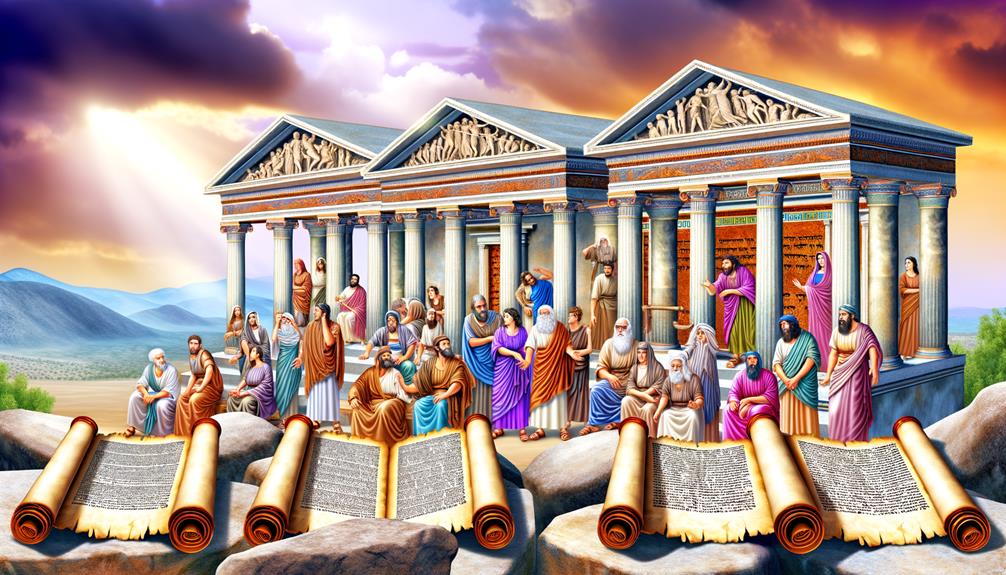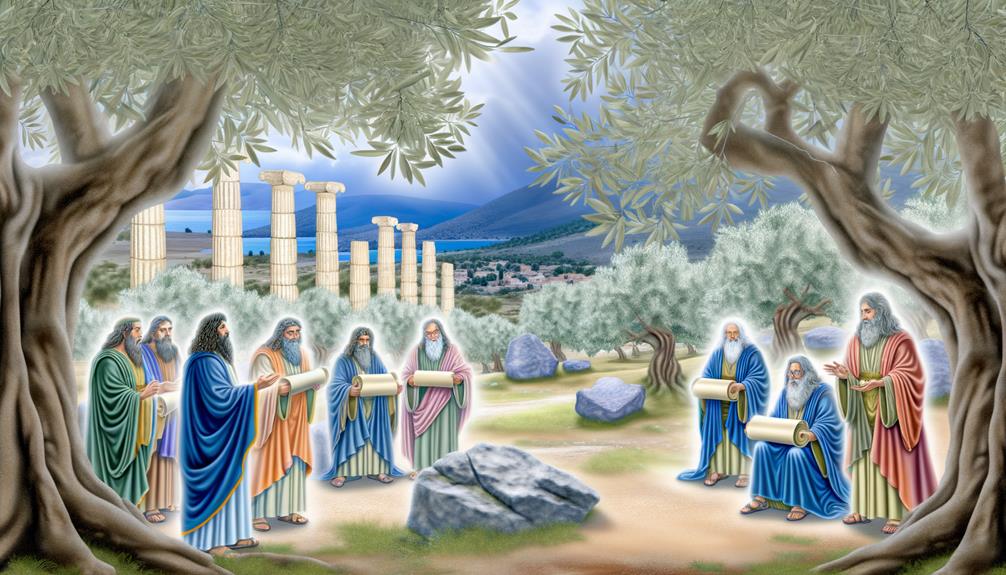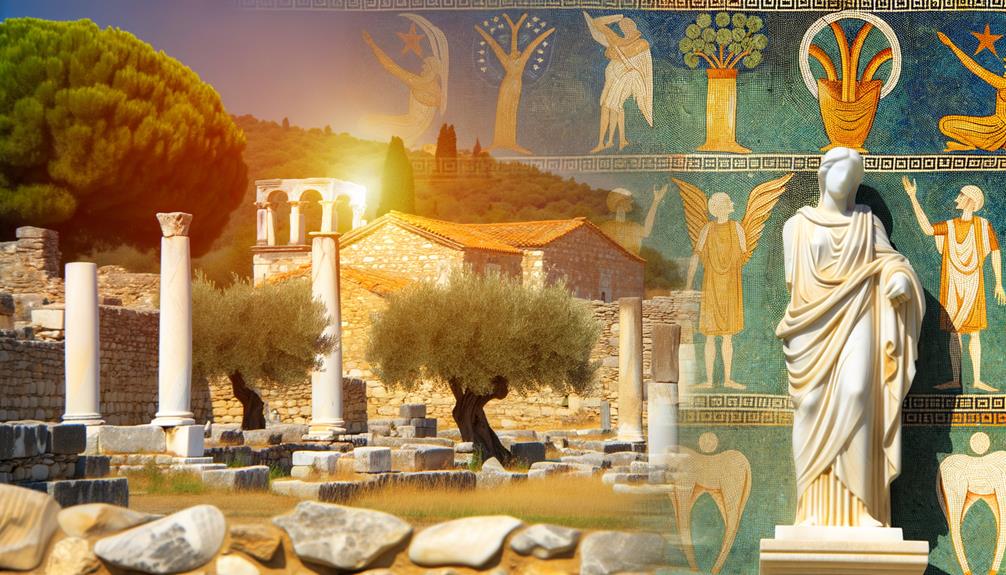Meaning of Grecia in the Bible: Prophetic Reference
In the Bible, ‘Grecia’ refers to the ancient Greek world and its significant influence on Jewish and early Christian societies. In the Old Scriptures, it appears in prophetic texts like Daniel and Joel, symbolizing geopolitical power, particularly through the conquests of Alexander the Great.
The New Testament highlights the critical role of Hellenistic culture in spreading Christianity, especially through Apostle Paul’s missions and the use of Koine Greek for scripture. Grecia’s integration of Greek philosophy and language profoundly shaped theological and societal development, bridging Jewish traditions and Christian doctrine, with deeper insights available for exploration.

Meaning of Grecia in the Bible: Historical and Prophetic Significance
| Aspect | Biblical Reference | Spiritual Insight |
|---|---|---|
| Historical Nation | Grecia refers to ancient Greece | A major world power during biblical prophetic eras |
| Book of Daniel | Mentioned in end-time prophecies | Symbolizes the rise and fall of empires under God’s plan |
| Alexander the Great | Foretold as a powerful king in Daniel 8 | Demonstrates God’s foreknowledge of world events |
| Cultural Influence | Spread of Hellenistic culture | Impacted Jewish thought and later Christian theology |
| Prophetic Symbolism | Represented by the leopard in Daniel 7 | Swift conquest and divine orchestration of kingdoms |
Historical Context of Grecia

The historical context of Grecia in the Bible can be traced back to the Hellenistic period, during which Greek culture and influence permeated the Eastern Mediterranean region.
Following Alexander the Great‘s conquests, Hellenistic civilization brought significant cultural, political, and intellectual changes to areas including Judea. Greek became the lingua franca, facilitating communication and trade.
This period saw the translation of Hebrew scriptures into Greek, known as the Septuagint, which played a vital role in making Jewish religious texts accessible to a broader audience.
The Hellenistic influence is evident in various aspects of Jewish society, including philosophy, administration, and daily life, laying the groundwork for interactions between Jewish and Greek thought that are reflected in later biblical narratives.
Grecia in Old Testament

Mention of Grecia in the Old scripture primarily appears in the context of prophetic visions and historical accounts that highlight the interactions between the Israelites and the Hellenistic world.
Significantly, the Book of Daniel references Grecia in the prophetic vision of the four kingdoms, symbolizing the rise and eventual fall of the Greek Empire under Alexander the Great and his successors.
Additionally, the Book of Joel hints at the distant lands, including Grecia, in the context of divine judgment.
These references underscore the broader geopolitical influence Grecia had during the period, serving as a harbinger of significant cultural and political shifts that would later impact the Israelite society.
This interplay provides critical insights into the evolving dynamics between these ancient civilizations.
Grecia in New Testament

In the New Covenant, Grecia’s role is notably highlighted through its profound influence on early Christianity and the missionary work of Apostle Paul.
The Hellenistic culture provided a common language and philosophical framework that facilitated the spread of Christian teachings across the Mediterranean.
Apostle Paul’s missions to Greek cities such as Corinth, Thessalonica, and Athens were pivotal in establishing and nurturing early Christian communities.
Grecian Influence on Christianity
How did the cultural and philosophical heritage of ancient Greece shape the development of early Christian thought as reflected in the New Writings?
The Hellenistic influence on Christianity is profound, blending Jewish theology with Greek philosophy.
This synthesis is evident in:
- Language and Text: The New Document was written in Koine Greek, making it accessible to a broader audience and allowing Greek philosophical terms to permeate Christian theology.
- Philosophical Concepts: Greek ideas of logos (reason) and ethos (character) were integrated into Christian teachings, enriching the theological discourse.
- Moral and Ethical Thought: Greek ethical frameworks influenced Christian moral teachings, providing a structured approach to virtues and vices.
These elements collectively demonstrate the significant impact of Greek culture on early Christian development.
Apostle Paul’s Greek Missions
Apostle Paul’s missionary journeys to Greece, as documented in the New Scriptures, were pivotal in establishing early Christian communities in major Hellenistic cities such as Corinth, Athens, and Thessalonica.
His efforts in Corinth are notable for addressing moral and doctrinal issues within the fledgling church, as evidenced by his epistles.
In Athens, Paul engaged with philosophers at the Areopagus, presenting Christianity in a context familiar to Greek intellectuals.
Thessalonica, a key trade hub, saw Paul successfully plant a church despite opposition.
These missions not only expanded the geographical spread of Christianity but also integrated Hellenistic thought, fostering a synthesis that would profoundly shape the theological and cultural development of early Christianity.
Prophecies About Grecia

Biblical prophecies about Grecia often focus on the rise and influence of the Greek Empire, as well as its interactions with other nations and the fulfillment of divine plans. These prophecies appear primarily in the Old Covenant and highlight significant events.
Particularly, the Book of Daniel provides a detailed account:
- Daniel’s Vision of the Four Beasts (Daniel 7:6): Grecia is symbolized by a leopard with four wings and four heads, indicating its swift and powerful expansion.
- The Ram and the Goat (Daniel 8:5-8): The goat represents Grecia, overcoming the ram, symbolizing Persia, showcasing the Greek conquest.
- The Vision of the Kings (Daniel 11:3-4): The prophecy foretells the rise of a mighty Greek king, typically identified as Alexander the Great, and the subsequent division of his empire.
Cultural Influence of Grecia

The cultural influence of Grecia on the ancient world is profound, permeating various aspects of life including philosophy, art, language, and governance.
Greek philosophy laid the foundation for Western thought, with figures like Socrates, Plato, and Aristotle shaping intellectual discourse.
In art, Greek aesthetics defined ideals of beauty and realism, influencing later Roman and Renaissance works.
The Greek language, particularly Koine Greek, became the lingua franca of the Eastern Mediterranean, facilitating communication and trade.
Greek governance models, especially democracy and republicanism, influenced political systems far beyond their time.
This pervasive cultural legacy not only impacted contemporaneous civilizations but also set the stage for subsequent cultural and intellectual developments in the Western world.
Grecia and Biblical Prophets

Examining the interactions between Grecia and Biblical prophets reveals a complex interplay of cultural and prophetic influences that shaped ancient Judeo-Christian thought. Prophets such as Daniel and Isaiah provided insights into the significance of Grecia within a divine framework.
Significantly, these interactions can be categorized as follows:
- Prophetic Revelations: Daniel’s visions (Daniel 8, 10-11) depict the rise and fall of Greek empires, highlighting their impact on Israel’s destiny.
- Cultural Exchange: The spread of Hellenistic culture influenced Jewish traditions, leading to a blend of Greek philosophy and Jewish theology.
- Historical Fulfillment: Prophecies about Grecia were fulfilled through historical events, such as Alexander the Great’s conquests, which were seen as divine orchestration.
This synthesis underscores the profound influence of Grecia on Biblical prophecy.
Key Figures From Grecia

The influence of key figures from Grecia, particularly Alexander the Great, notably shaped the cultural and political landscape of the ancient Near East.
Alexander’s conquests facilitated the spread of Hellenistic culture, which subsequently permeated various aspects of Jewish life and thought.
This intersection of Greek and Jewish traditions is evident in the historical and religious texts of the period, revealing a complex interplay between these two civilizations.
Alexander the Great
Renowned for his unparalleled conquests and strategic military prowess, Alexander the Great emerges as a pivotal figure within the historical and biblical context of Grecia. His influence extends beyond mere territorial expansion, shaping the geopolitical and cultural landscape of the ancient world.
In the Bible, Alexander’s significance can be observed through:
- Prophetic Fulfillment: Alexander is often identified with the ‘he-goat’ in Daniel 8, symbolizing his rapid and decisive victories.
- Cultural Integration: His conquests facilitated the spread of Greek language and customs, setting the stage for subsequent Hellenistic influence.
- Historical Impact: The dissolution of his empire into four successor states aligns with the prophetic visions described in Daniel 7 and 8.
Alexander’s legacy is consequently intricately woven into biblical history.
Hellenistic Influence
With the rise of Alexander the Great, the Hellenistic period ushered in a profound transformation across the ancient world, influenced by key figures such as Ptolemy, Seleucus, and Antigonus.
Ptolemy I Soter established the Ptolemaic dynasty in Egypt, fostering advancements in science and culture.
Seleucus I Nicator founded the Seleucid Empire, extending Hellenistic influence throughout Asia.
Antigonus I Monophthalmus, a formidable general, controlled parts of Asia Minor, contributing considerably to the spread of Hellenistic culture.
These successors, or Diadochi, not only expanded Greek cultural and political paradigms but also set the stage for the syncretism evident in the biblical context.
Their legacies underscore the pervasive impact of Hellenistic ideals on subsequent historical and religious developments.
Greece and Early Christianity

Given its strategic location and cultural influence, Greece played a pivotal role in the spread of early Christianity.
The significance of Greece in this regard can be analyzed through several key factors:
- Geographical Position: Greece served as a crossroads between East and West, facilitating missionary journeys and the dissemination of Christian teachings.
- Intellectual Heritage: Greek philosophical traditions provided a foundation for theological discourse and the articulation of Christian doctrines.
- Urban Centers: Cities like Athens and Corinth became important hubs for early Christian communities and evangelistic efforts.
These elements collectively underscore Greece’s critical contribution to the nascent Christian movement, shaping its development and expansion across the Roman Empire.
Understanding these dynamics provides deeper insight into the historical interplay between Christianity and Greek culture.
Language and Scripture

How did the Greek language shape the development and interpretation of biblical scripture in early Christianity?
The Greek language served as a pivotal medium for the dissemination of Christian texts. The Septuagint, a Greek translation of Hebrew Scriptures, made the sacred texts accessible to a broader Hellenistic audience.
In addition, the New Scriptures was originally composed in Koine Greek, which was the lingua franca of the Eastern Mediterranean. This choice facilitated the spread of Christian doctrine beyond Jewish communities into the Gentile world.
Greek’s rich vocabulary and precise syntax allowed for nuanced theological expression, thereby shaping early Christian thought and exegesis.
Consequently, the Greek language played an instrumental role in both the preservation and propagation of biblical scripture during early Christianity.
Grecia’s Spiritual Legacy

The profound impact of the Greek language on early Christian scripture laid the foundation for Grecia’s enduring spiritual legacy within the biblical narrative.
This legacy manifests in various ways:
- Philosophical Integration: Greek philosophical concepts were integrated into Christian theology, enriching doctrinal formulations.
- Scriptural Precision: The Koine Greek language provided a precise medium for the articulation of complex theological ideas in the New Covenant.
- Cultural Exchange: The Hellenistic culture facilitated the spread of Christian teachings across diverse regions, enhancing cross-cultural understanding.
These elements underscore Grecia’s significant role in shaping early Christian thought and practice, demonstrating how linguistic and cultural influences have long-lasting spiritual and theological impacts within the biblical tradition.
This legacy continues to be studied and revered in theological circles today.
Lessons From Grecia

Understanding the lessons from Grecia involves an exploration of its historical context, its significance within biblical narratives, and the modern implications these lessons may hold.
Analyzing Grecia’s role in the Bible reveals how its cultural and political dynamics influenced religious thought and practice.
Historical Context of Grecia
When examining the historical context of Grecia as referenced in the Bible, it is essential to contemplate the geopolitical and cultural landscape of ancient Greece and its interactions with surrounding civilizations. This period saw Greece evolve from fragmented city-states into a dominant empire, influencing both Eastern and Western worlds.
Key historical aspects include:
- Hellenistic Expansion: Following the conquests of Alexander the Great, Greek culture and political influence spread extensively across the Mediterranean and Near East.
- Philosophical Developments: Greek philosophy, exemplified by figures such as Socrates, Plato, and Aristotle, profoundly shaped Western thought.
- Military Strategies: Greek military tactics, particularly the phalanx formation, revolutionized warfare and were emulated by subsequent civilizations.
Understanding these factors provides a backdrop for Grecia’s portrayal in biblical texts.
Grecia’s Biblical Significance
Numerous biblical references to Grecia highlight its significant influence on the cultural, intellectual, and political landscapes of the ancient world.
The Hellenistic period, ushered in by Alexander the Great, profoundly affected Jewish life and thought, as seen in the intertestamental period. The Greek language became the lingua franca, facilitating the spread of the Septuagint, the Greek translation of Hebrew Scriptures.
This translation played an essential role in making Jewish teachings more accessible to the Hellenistic world, thereby impacting early Christian evangelism.
In addition, Greek philosophy and governance models influenced Jewish and early Christian thought, as evident in the writings of Paul, who often engaged with Greek philosophical ideas to communicate his theological messages effectively.
Modern Lessons From Grecia
How can the profound cultural and intellectual legacy of ancient Grecia inform contemporary society’s approach to education, governance, and intercultural dialogue?
Ancient Grecia offers timeless insights that remain pertinent today:
- Education: The Socratic method encourages critical thinking and dialogue, essential for modern pedagogical practices.
- Governance: Athenian democracy, despite its imperfections, underscores the importance of citizen participation and deliberative processes in decision-making.
- Intercultural Dialogue: Hellenistic civilization exemplifies the benefits of cultural exchange and synthesis, fostering mutual respect and understanding.
Analyzing these historical precedents provides a framework for enhancing our current systems.
Conclusion
The exploration of Grecia within biblical contexts reveals its profound historical, cultural, and spiritual influence.
Grecia’s presence in both the Old and New Scriptures, its prophetic significance, and its role in shaping early Christianity are akin to threads woven into the rich tapestry of religious history.
The linguistic contributions and enduring spiritual legacy of Grecia offer valuable lessons, underscoring its integral role in the development of biblical traditions and Christian thought.






